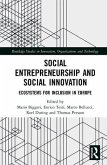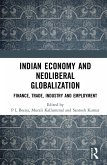Innovation in Capitalist Economies
Crises, Challenges and Opportunities
Herausgeber: Ulgen, Faruk; Klapkiv, Lyubov
Innovation in Capitalist Economies
Crises, Challenges and Opportunities
Herausgeber: Ulgen, Faruk; Klapkiv, Lyubov
- Gebundenes Buch
- Merkliste
- Auf die Merkliste
- Bewerten Bewerten
- Teilen
- Produkt teilen
- Produkterinnerung
- Produkterinnerung
Innovation is critical to increasing global prosperity and is also essential to surviving and overcoming the ongoing challenges of pandemics, wars, climate change and systemic financial turmoil.
Andere Kunden interessierten sich auch für
![Social Democracy in Capitalist Society (Routledge Revivals) Social Democracy in Capitalist Society (Routledge Revivals)]() Richard ScaseSocial Democracy in Capitalist Society (Routledge Revivals)159,99 €
Richard ScaseSocial Democracy in Capitalist Society (Routledge Revivals)159,99 €![Commodity Frontiers and Global Capitalist Expansion Commodity Frontiers and Global Capitalist Expansion]() Commodity Frontiers and Global Capitalist Expansion113,99 €
Commodity Frontiers and Global Capitalist Expansion113,99 €![Perspectives on Economics and Management Perspectives on Economics and Management]() Perspectives on Economics and Management191,99 €
Perspectives on Economics and Management191,99 €![Social Entrepreneurship and Social Innovation Social Entrepreneurship and Social Innovation]() Social Entrepreneurship and Social Innovation206,99 €
Social Entrepreneurship and Social Innovation206,99 €![Indian Economy and Neoliberal Globalization Indian Economy and Neoliberal Globalization]() Indian Economy and Neoliberal Globalization180,99 €
Indian Economy and Neoliberal Globalization180,99 €![Capitalist Diversity and Change Recombinant Governance and Institutional Entrepreneurs Capitalist Diversity and Change Recombinant Governance and Institutional Entrepreneurs]() Colin CrouchCapitalist Diversity and Change Recombinant Governance and Institutional Entrepreneurs75,99 €
Colin CrouchCapitalist Diversity and Change Recombinant Governance and Institutional Entrepreneurs75,99 €![Rethinking Capitalist Development Rethinking Capitalist Development]() Tracy Mott / Nina Shapiro (eds.)Rethinking Capitalist Development215,99 €
Tracy Mott / Nina Shapiro (eds.)Rethinking Capitalist Development215,99 €-
-
-
Innovation is critical to increasing global prosperity and is also essential to surviving and overcoming the ongoing challenges of pandemics, wars, climate change and systemic financial turmoil.
Hinweis: Dieser Artikel kann nur an eine deutsche Lieferadresse ausgeliefert werden.
Hinweis: Dieser Artikel kann nur an eine deutsche Lieferadresse ausgeliefert werden.
Produktdetails
- Produktdetails
- Verlag: Taylor & Francis Ltd
- Seitenzahl: 218
- Erscheinungstermin: 3. März 2025
- Englisch
- Abmessung: 234mm x 156mm
- ISBN-13: 9781032904597
- ISBN-10: 1032904593
- Artikelnr.: 72004172
- Herstellerkennzeichnung
- Libri GmbH
- Europaallee 1
- 36244 Bad Hersfeld
- gpsr@libri.de
- Verlag: Taylor & Francis Ltd
- Seitenzahl: 218
- Erscheinungstermin: 3. März 2025
- Englisch
- Abmessung: 234mm x 156mm
- ISBN-13: 9781032904597
- ISBN-10: 1032904593
- Artikelnr.: 72004172
- Herstellerkennzeichnung
- Libri GmbH
- Europaallee 1
- 36244 Bad Hersfeld
- gpsr@libri.de
Faruk Ülgen is a Professor of Economics, Head of International Relations and Bachelor Distance Learning Programs within the Department of Economics at the Université Grenoble Alpes, France. He also serves as Codirector of the Center of Research in Economics of Grenoble (CREG). His current research focuses on the evolution of financial markets and innovations and the evolution of financial regulation and supervision from an institutionalist-evolutionary perspective, drawing on collective action and the economics of the commons. Lyubov Klapkiv, PhD, is Assistant Professor at the University Maria Curie-Sk¿odowska in Lublin (Institute of Economics and Finance) and Visiting Professor at the University Grenoble Alpes (2022-2024). She received her PhD degree in Finance from the Kyiv National University of Trade and Economics, Ukraine. She is a graduate of the Line Kirkland Scholarship program 2015/2016. Her main research fields include the economics of insurance, sustainable finance, and financial innovations.
Introduction. What is innovation in economics in the 21st century? PART I.
TECHNOLOGICAL, ORGANIZATIONAL AND FINANCIAL DETERMINANTS OF INNOVATIONS 1.
Creative destruction. The driver for innovation, financing and the business
cycle 2. The strengths of worker cooperatives in innovation processes: a
way to find the 'truth' of the firm 3. Promoting SME innovation in the
Western Balkans 4. Exploring firm environmental performance through
creative communities: a capabilities-based perspective 5. Mechanisms of
implementation of innovation in modern business management ¿ selected
issues PART II. INNOVATIONS AND MODERN FINANCE: CURRENT ISSUES 6. Green
bonds as a financial driver for the transition towards a climate-neutral
economy in Europe 7. Managing war-related risks in international trade:
innovative insurance products 8. Technological innovation as a basis for a
paradigm shift in insurance the search for new sharing economy effects 9.
Fintech market development trends during pandemic Covid-19 10. Monetary
finance as an innovative way to fund public investment: an appraisal 11.
Innovative insurance market's products for a sustainable economy: the
example of waste management in the European Union Index
TECHNOLOGICAL, ORGANIZATIONAL AND FINANCIAL DETERMINANTS OF INNOVATIONS 1.
Creative destruction. The driver for innovation, financing and the business
cycle 2. The strengths of worker cooperatives in innovation processes: a
way to find the 'truth' of the firm 3. Promoting SME innovation in the
Western Balkans 4. Exploring firm environmental performance through
creative communities: a capabilities-based perspective 5. Mechanisms of
implementation of innovation in modern business management ¿ selected
issues PART II. INNOVATIONS AND MODERN FINANCE: CURRENT ISSUES 6. Green
bonds as a financial driver for the transition towards a climate-neutral
economy in Europe 7. Managing war-related risks in international trade:
innovative insurance products 8. Technological innovation as a basis for a
paradigm shift in insurance the search for new sharing economy effects 9.
Fintech market development trends during pandemic Covid-19 10. Monetary
finance as an innovative way to fund public investment: an appraisal 11.
Innovative insurance market's products for a sustainable economy: the
example of waste management in the European Union Index
Introduction. What is innovation in economics in the 21st century? PART I.
TECHNOLOGICAL, ORGANIZATIONAL AND FINANCIAL DETERMINANTS OF INNOVATIONS 1.
Creative destruction. The driver for innovation, financing and the business
cycle 2. The strengths of worker cooperatives in innovation processes: a
way to find the 'truth' of the firm 3. Promoting SME innovation in the
Western Balkans 4. Exploring firm environmental performance through
creative communities: a capabilities-based perspective 5. Mechanisms of
implementation of innovation in modern business management ¿ selected
issues PART II. INNOVATIONS AND MODERN FINANCE: CURRENT ISSUES 6. Green
bonds as a financial driver for the transition towards a climate-neutral
economy in Europe 7. Managing war-related risks in international trade:
innovative insurance products 8. Technological innovation as a basis for a
paradigm shift in insurance the search for new sharing economy effects 9.
Fintech market development trends during pandemic Covid-19 10. Monetary
finance as an innovative way to fund public investment: an appraisal 11.
Innovative insurance market's products for a sustainable economy: the
example of waste management in the European Union Index
TECHNOLOGICAL, ORGANIZATIONAL AND FINANCIAL DETERMINANTS OF INNOVATIONS 1.
Creative destruction. The driver for innovation, financing and the business
cycle 2. The strengths of worker cooperatives in innovation processes: a
way to find the 'truth' of the firm 3. Promoting SME innovation in the
Western Balkans 4. Exploring firm environmental performance through
creative communities: a capabilities-based perspective 5. Mechanisms of
implementation of innovation in modern business management ¿ selected
issues PART II. INNOVATIONS AND MODERN FINANCE: CURRENT ISSUES 6. Green
bonds as a financial driver for the transition towards a climate-neutral
economy in Europe 7. Managing war-related risks in international trade:
innovative insurance products 8. Technological innovation as a basis for a
paradigm shift in insurance the search for new sharing economy effects 9.
Fintech market development trends during pandemic Covid-19 10. Monetary
finance as an innovative way to fund public investment: an appraisal 11.
Innovative insurance market's products for a sustainable economy: the
example of waste management in the European Union Index








